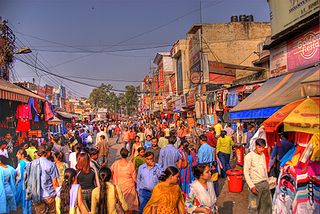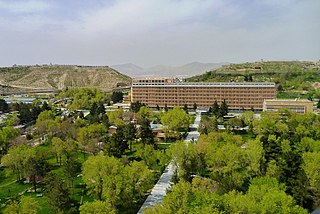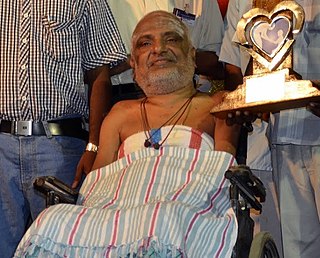
Indira Priyadarshini Gandhi was an Indian politician and a central figure of the Indian National Congress. She was the 3rd prime minister of India and was also the first and, to date, only female prime minister of India. Gandhi was the daughter of Jawaharlal Nehru, the 1st prime minister of India. She served as prime minister from January 1966 to March 1977 and again from January 1980 until her assassination in October 1984, making her the second longest-serving Indian prime minister after her father.

Jalalabad is the fifth-largest city of Afghanistan. It has a population of about 356,274, and serves as the capital of Nangarhar Province in the eastern part of the country, about 130 kilometres (80 mi) from the capital Kabul. Jalalabad is located at the junction of the Kabul River and the Kunar River in a plateau to the south of the Hindu Kush mountains. It is linked by highways with Kabul to the west and the Pakistani city of Peshawar to the east including through the Khyber Pass.

Kabul is the capital and largest city of Afghanistan, located in the eastern section of the country. It is also a municipality, forming part of the greater Kabul Province, and divided into 22 districts. According to estimates in 2021, the population of Kabul was 4.6 million and it serves as Afghanistan's political, cultural and economical center. Rapid urbanization has made Kabul the world's 75th largest city.

The Indian National Congress is a political party in India with widespread roots. Founded in 1885 by A O Hume and others, it was the first modern nationalist movement to emerge in the British Empire in Asia and Africa. From the late 19th century, and especially after 1920, under the leadership of Mahatma Gandhi, Congress became the principal leader of the Indian independence movement. Congress led India to independence from the United Kingdom, and powerfully influenced other anti-colonial nationalist movements in the British Empire.

Feroze Gandhi was an Indian freedom fighter, politician and journalist.

Varun Gandhi(listen) is an Indian politician, and a third-term member of Parliament for Lok Sabha from the Pilibhit constituency. He is also member of the Bharatiya Janata Party and was inducted into Rajnath Singh's team in March 2012 as General Secretary. He hails from the Nehru–Gandhi family, which has occupied a prominent place in the politics of India since the country's independence in 1947.

Lajpat Nagar is a residential and commercial neighborhood in the South East Delhi district of Delhi. It was named in honor of Lala Lajpat Rai and is today most known for the Lajpat Nagar Central Market. This area is not to be confused with the Lajpat Nagar in Ghaziabad in the NCR region.

The Catholic Church in Afghanistan is part of the worldwide Catholic Church. There are very few Catholics/Christians in this overwhelmingly Muslim country—just over 200 attend Mass in its only chapel—and freedom of religion has been difficult to obtain in recent times, especially under the new de-facto Taliban regime.

Kabul Express is a 2006 Indian Hindi-language adventure film written and directed by documentary film maker Kabir Khan and produced by Aditya Chopra under Yash Raj Films was released on 15 December 2006. The film stars John Abraham, Arshad Warsi, Pakistani actor Salman Shahid, Afghan actor Hanif Hum Ghum and American actress Linda Arsenio. Kabul Express is the first fictional film for director Kabir Khan who has made several documentaries over the years in Afghanistan. According to Khan, Kabul Express is loosely based on his and his friend Rajan Kapoor's experiences in post-Taliban Afghanistan.
Kabul City Center is a shopping mall in Shahr-e Naw, Kabul, Afghanistan. Opened in 2005, it consists of 100 stores and a food court. It is equipped with see-through elevators and escalators and is notable for being the first building in Kabul to be equipped with functional escalators. The building also includes the Safi Landmark Hotel, a 4-star hotel that occupies the top six of the building's ten floors. The Safi Landmark has become one of the most famous hotels in Kabul for visitors and foreigners. The building has been subject to two terrorist attacks, in 2010 and 2011. In 2013, the mall received media attention for housing an unofficial Apple Store.

Healthcare in Afghanistan is provided by over 3,000 health facilities found throughout the country. The decades of war and neglect by the world community has destroyed Afghanistan's already-poor healthcare system. Most Afghan medical professionals immigrated to other countries by 1992, and all medical training programs ceased afterwards. The drought of 1999–2002 exacerbated these conditions.

Afghanistan–India relations referred to the diplomatic relations between India and Islamic Republic of Afghanistan, which governed most of Afghanistan between 2001 and 2021. They had been historical neighbours, and share cultural ties through Bollywood and cricket.

The 2008 Indian embassy bombing in Kabul was a suicide bomb terror attack on the Indian embassy in Kabul, Afghanistan on 7 July 2008 at 8:30 AM local time. The bombing killed 58 people and wounded 141. The suicide car bombing took place near the gates of the embassy during morning hours when officials enter the embassy.

ADAPT – Able Disabled All People Together is an Indian non-profit and non-governmental organization, working to help people with neuro-muscular and developmental disabilities. It was started on 2 October 1972 by Mithu Alur, to provide education and treatment services for the spastics.
The February 2010 Kabul attack on 26 February 2010 was a combined suicide bombing and shooting attack. A car bomb levelled the Arya Guesthouse, also known as the Hamid Guesthouse, popular with Indian doctors. Two armed attackers then entered the nearby Park Residence, housing other foreigners. One detonated a suicide bomb, and the other was shot dead. The Safi Landmark Hotel nearby was badly damaged by the blasts. At least 18 people were killed and 36 more were injured.
There used to be a small community of Indians in Afghanistan who are Afghans of Indian origin as well as Indian construction and aid workers involved in rebuilding and humanitarian assistance efforts. India is often described as acting as a soft power in Afghanistan. Having committed a $2.3 billion aid programme, India is one of the largest donors to Afghanistan, investing in the economy, humanitarian aid, education, development, construction and electrical. According to Foreign Policy among Afghans there is a positive perception of India's role in the reconstruction efforts in Afghanistan.

Mithu Alur usually referred to as Dr. Mithu Alur, is the founder chairperson of The Spastic Society of India - now rechristened ADAPT - Able Disable All People Together, educator, disability rights activist, researcher, writer and published author on issues concerning people with disability in India.

S. Ramakrishnan is the founder president of Amar Seva Sangam, Ayikudi, Tamil Nadu, India. He is known for his contributions to the field of rehabilitation for persons with disabilities. Ramakrishnan was awarded the civilian honour, Padma Shri, by Government of India for the year 2020.
The following is a timeline of the history of Kabul, Afghanistan.
On 8 March 2017, the Sardar Daud Khan Military Hospital in Kabul, Afghanistan, was attacked by a group of gunmen, some of them dressed in white hospital robes. Government officials confirmed at least 49 people were killed in the hours-long assault, while 63 others were injured. By March 13 the unconfirmed death toll had surpassed 100, with an unknown number injured. The Islamic State of Iraq and the Levant claimed to have carried out the attack, but officials suspected the Haqqani network instead.















